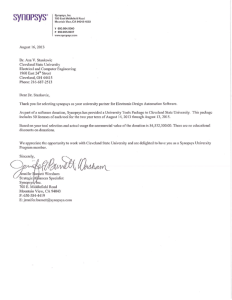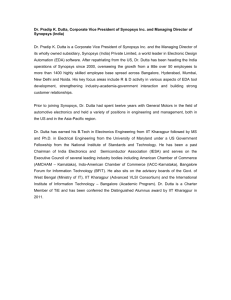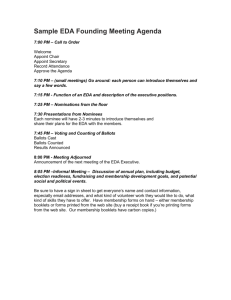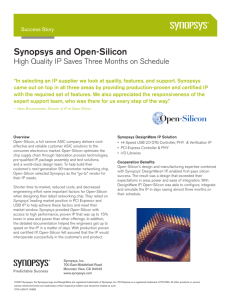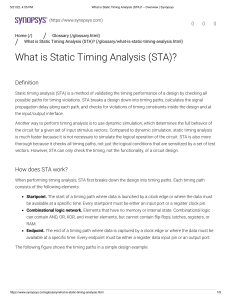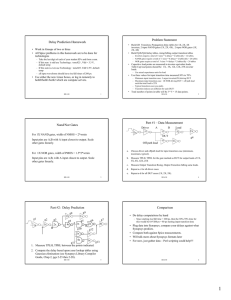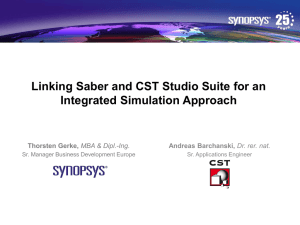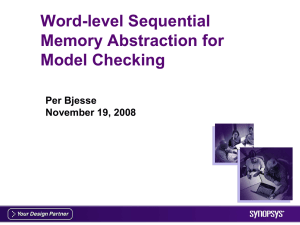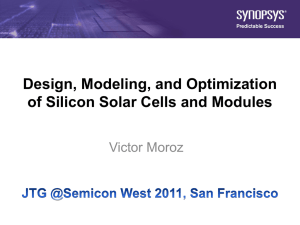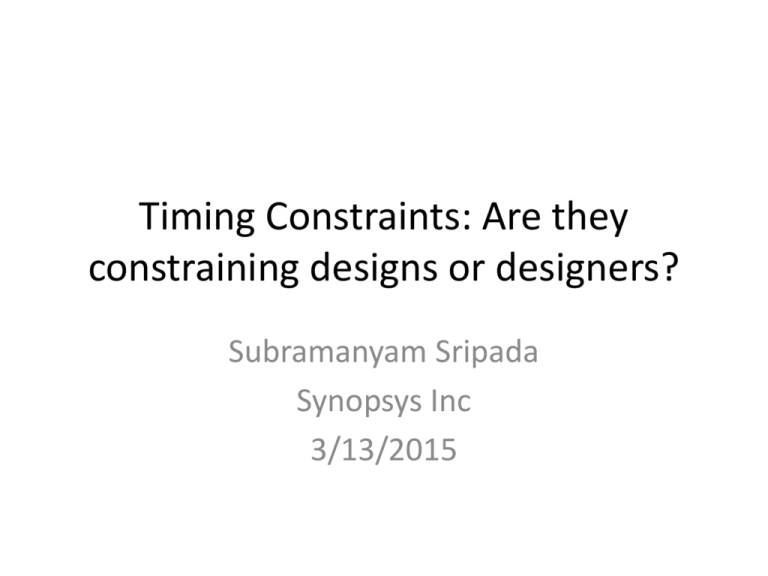
Timing Constraints: Are they
constraining designs or designers?
Subramanyam Sripada
Synopsys Inc
3/13/2015
Constraint Analysis/Debug/Management
More Modes
Functional
Scan
Test
More Files/
More complex
constraints
Difficult
integration
of chip-level
constraints
Timing
Constraints
Budgeting Issues
IP Blocks
Reused Cores
Blocks
Low_Power
Synthesis, P&R, Signoff
Constraint Issues
• Incomplete, inconsistent or conflicting
constraints
• Inconsistent block-level and top-level
constraints
• Automatic generation of timing constraints vs
verification of manually generated timing
constraints
• Detection, Debugging and Fixing
• Dealing with MMMC constraints
Panel Details
•
•
•
•
•
Need of clean SDC for design flows
Challenges in generating clean SDC
State of current EDA tools
What is needed from EDA tools?
Panelists
–
–
–
–
–
–
Texas Instruments
Ausdia
Intel
FishTail
Altera
Synopsys
Krishna Panda
Krishna Panda is STA Technologist at Texas
Instruments. He has been responsible Timing
and Signal Integrity Signoff for the past three
technology Node. He is a Member of Technical
Staff at TI. Joined Texas Instrument in
2002. He has a Bachelor’s Degree in Electronics
Engineering from Mumbai University and has
20+ years of ASIC design experience.
Sam Appleton
Sam co-founded Ausdia, and drove the early product
planning, product development and market analysis for
Timevision. Prior to Ausdia, Sam held a variety of technical
leadership roles at Azul Systems, Reshape, Cosine
Communications and Silicon Graphics. At Azul Systems, Sam
drove the implementation & physical methodology for three
generations of custom SMP processors, from 500 to 900Mhz
and 1.2B transistors.
Sam received a Ph.D. in Electronic Engineering from the
University of Adelaide, focused on high-performance
asynchronous circuit & logic design. He has personally been
involved in more than 20 tape outs from 1um to 28nm.
Bruce Zahn
Bruce is part of the newly acquired Axxia network processor group
at Intel in Allentown PA, working on design methodologies. His
areas of focus include static timing analysis, constraint verification,
timing closure and low power design techniques.
He has been at Intel (previously Avago Technologies, LSI, Agere
Systems, Lucent – Microelectronics, AT&T) for 20 years. Prior to
that, he was a Field Application Engineer at Racal Redac in NJ,
and a Design Engineer at Raytheon in Tewksbury MA.
He has received a Masters of Science in Electrical Engineering
from Northeastern University, and a Bachelor of Science in
Electrical Engineering from the State University of New York at
Stony Brook.
7
Ajay Daga
Ajay received his PhD in Computer Engineering from The
University of Michigan, Ann Arbor in 1994. Ajay worked in
Mentor Graphics and Synopsys before founding, funding and
growing FishTail revenues.
Tom Spyrou
Tom Spyrou has worked for over 25 years as an EDA
Technologist and has gained extensive experience in
areas including Static Timing Analysis, Logic Synthesis,
Power Grid Analysis, Database Technology and Floorplanning. He has lead the development of leading edge
commercial engines and products such as PrimeTime,
Voltage Storm, First Encounter, and the Open Access
Database. He has a BS from CMU in ECE and and MS
from Santa Clara. He is currently the Architect of
Altera’s new TimeQuest2 STA tool.
9
Qiuyang Wu
Qiuyang Wu has been in the EDA industry for 15 years,
with expertise in STA, Synthesis, P&R, also extensive
experiences in parallel programing and large-scale
distributed processing. As an architect for hierarchical
timing and methodology in PrimeTime with Synopsys, his
current focus ranges from macro modeling, hierarchical
analysis, constraint management. He holds master’s
degrees in physics and computer science in 2000.
© 2015 Synopsys, Inc. All rights reserved. 10


